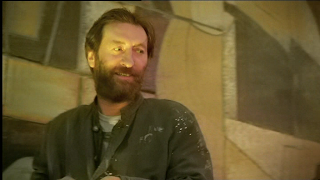Pupendo * * *
 Pupendo (link to DVD on Amazon)
Pupendo (link to DVD on Amazon)"One day a little tapeworm poked her head out of an anus, looked around at the big wide world. She popped back in and raced to find her mother. 'Oh, mommy tapeworm what is that great and lovely blueness that is all around outside?' 'That my darling is the sky.' 'Oh mommy tapeworm, what is that beautiful yellow orb in the sky?' 'That my darling is the sun.' 'But why mommy, why do we live here, here in the dark?' 'Oh my darling, because this, this is our HOME...yes, my darling, up someone's ass.' -- a joke told by an insurance appraiser from the movie Pupendo.

This movie is a comedy-drama about the 1980s in Czechoslovakia, and that little joke sums up the Czech perspective pretty well. Yes, we're living in crap, but nonetheless it's home. The story follows a talented Prague artist, Bedrich Mara, who in the heady years around the 1968 Prague Spring was one of the top artists in the country with his work shown in the west. But he refused to make the necessary compromises (join the communist party presumably) and has fallen out of favor with the authorities. He loses his job, is ostracized from the art community, and barely brings home enough for his family by making kitschy clay things, like a money bank that looks like a butt. The movie tells the story of a summer in which on a bit of a lark, he brings home a bum. The bum turns out to be an art historian caught at a particularly low point. And through a bitter-sweet series of events, he helps Bedrich return to the international art world -- although at costs that have a certain black humor to them.
Pupendo is by the same director that made Pelisky, and it feels like a follow-up. Pelisky was a comedic-drama about life in the summer of 1968, while Pupendo is a drama-comedy about life in the 80s. But I think one reason Pelisky was more successful was that Pelisky combined funny with a very obvious tragedy -- the 1968 invasion. In Pupendo, the juxtaposition of funny and serious is not as effective -- perhaps because the tragedy of the 1970s and 1980s, the post-1968 period of "Normalization", is difficult to capture on film unlike tanks rolling down streets. "Normalization" is an Orwellian term because it refers to squelching the "abnormal" ideas of freedom of speech and civil liberty that dominated the the attempt at humanizing Czech communism (Jan-Aug 1968). I once heard a Czech describe the difference between the Stalinist oppression in the 1950s versus the Normalization oppression in the 1970s. In the 1950s, you were executed but there was a certain logic and predictability to what activities would get you killed. In the 1970s, you were ostracized rather than executed, but punishment was completely capricious. You think you are fine, and then some innocuous comment, or forgetting to put up a flag, gets you on the blacklist.
For this reason, I think the film probably has mainly home-market appeal, unlike Pelisky which is likely to be quite funny and tragic to non-Czechs also. Also Pelisky has Miroslav Donutil, one of the most famous Czech comedic actors, who is hilarious in the movie.
 Pupendo refers to a Czech "game" in which a heavy coin -- in this case a 5kc piece which is about like a Sacajawea or Loonie -- is thrown swiftly down onto the bare belly of the "recipient". If done correctly, the coin lands flat and gives a frightful sting. Video of pupendo being played. Why this movie-vignette about life in the 1980s in Czechoslovakia is named after this slightly sadomasochist game is unclear. Presumably it is meant as some kind of metaphor, but I couldn't quite get it.
Pupendo refers to a Czech "game" in which a heavy coin -- in this case a 5kc piece which is about like a Sacajawea or Loonie -- is thrown swiftly down onto the bare belly of the "recipient". If done correctly, the coin lands flat and gives a frightful sting. Video of pupendo being played. Why this movie-vignette about life in the 1980s in Czechoslovakia is named after this slightly sadomasochist game is unclear. Presumably it is meant as some kind of metaphor, but I couldn't quite get it.I purchased the DVD in the Czech Republic where it is widely available in video stores. Purchasing or renting it outside of CZ is difficult, but in the U.S. you can try searching on www.eBay.com; you'll sometimes find it for sale there.
Labels: communist era, Czech

<< Home